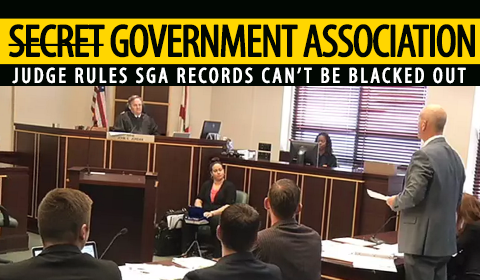BREAKING: Impeachment charges against A&SF Chair Josh Miller move forward to senate by a vote of 4-2. However, Speaker Wes Jones had his charges dismissed. Also, we’re working to find out if UCF broke public record law by refusing to release the impeachment documents to the public prior to the meeting, a controversial move UCF has been guilty of before. Check back for continuing coverage on this major controversy over how public money is spent.
UPDATE 1 P.M.: We just got this email sent by UCF right after the meeting started: “You can stop by my office to pick up a copy of the affidavit from my office at 6pm.” It’s not clear why it can’t be released now, or how much of it will be censored. We’ll update you when we know more. Check back for updates and high quality video replay of the meeting.
As KnightNews.com waits for the University of Central Florida to release the impeachment affidavits filed against two Student Government Association leaders to the public, KnightNews.com has discovered UCF still maintains a policy that delays the public’s access to public records — even though a lawyer warned the school it was “illegal” more than a year ago.
A July 2010 letter, written by a public records lawyer representing KnightNews.com at the time, warned UCF Associate General Counsel Youndy Cook that it was apparent UCF was hindering and delaying access to public records.
About a year-and-a-half later, UCF still maintains a controversial public records request form which states: “Public records requests will be reviewed within 72 business hours after form submission and will then be completed within a reasonable timeframe…”
A major issue UCF has when students and other members of the public ask for public information about how their money is being spent, is how long is “reasonable” for UCF to produce the records. UCF thinks it can wait three days before even beginning to look at a public records request — but the public records lawyer disagreed.
“I know you like to say ‘reasonable’ does not mean ‘immediate,’ but ‘reasonable’ does in fact mean ‘immediate’ if there is no legitimate reason not to produce the record immediately,” the lawyer wrote in the 2010 letter to UCF. “The 72-hour delay set forth in UCF’s own public records request form is illegal on its face under Canella (a reference to a Fla. Supreme Court case).”
KnightNews.com is working to find out if UCF’s decision to fail to release the impeachment affidavits by the end of the day — after KnightNews.com requested UCF do so first thing in the morning — constitutes a breach of the public records law. UCF has a history of waiting to release impeachment affidavits until the hearing where they’ll be discussed, but in the past had denied that’s its motivation for waiting.
In this case, the UCF employee assigned to respond to SGA public records requests told KnightNews.com, “Once appropriate actions and redactions have been made, I will be in contact with you regarding the release of this document.”
In the 10 a.m. request filed by KnightNews.com, it was explained to UCF that “It is our understanding that under a decision by the Florida Supreme Court in the case of Tribune Company v. Cannella the only delay permitted by the public records law is the limited reasonable time allowed for the custodian to retrieve the record and delete those portions of the record the custodian asserts are exempt.”
Penalties can include fines and even jail time for people who knowingly break public record law.
KnightNews.com will be at the UCF SGA’s Legislative Judicial and Rules committee meeting Thursday, where the impeachment affidavits filed against Wes Jones and Josh Miller are expected to be discussed. The meeting is expected to start around noon.






